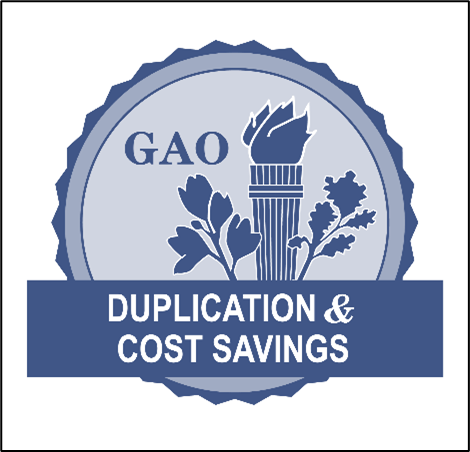2024 Annual Report: Additional Opportunities to Reduce Fragmentation, Overlap, and Duplication and Achieve Billions of Dollars in Financial Benefits
Fast Facts
Each year, GAO reports on federal programs with fragmented, overlapping, or duplicative goals or actions, and we have suggested hundreds of ways to address those problems, reduce costs, or boost revenue. In our 14th annual report, we identified 112 new matters for congressional consideration and recommendations to agencies to help address these findings.
Congressional and agency action in these areas has yielded about $667 billion in cost savings and revenue increases. Addressing remaining matters and recommendations could save tens of billions more dollars and improve government services.

Highlights
What GAO Found
GAO identified 112 new matters and recommendations in 42 new topic areas for Congress or federal agencies to improve the efficiency and effectiveness of government. For example:
- The Defense Counterintelligence and Security Agency should ensure its working capital fund cash balance is within its operating range, potentially saving its federal customers hundreds of millions of dollars through reduced prices.
- Congress and the Internal Revenue Service should take action to improve sole proprietor tax compliance, which could increase revenue by hundreds of millions of dollars per year.
- Agencies could save one hundred million dollars or more by using predictive models to make investment decisions on deferred maintenance and repair for federal buildings and structures.
- Congress should consider taking action that could help the Armed Forces Retirement Home address financial shortfalls to reduce the risk of exhausting the trust fund that supports it and potentially generate revenue of one hundred million dollars or more over 10 years.
- Federal agencies need building utilization benchmarks to help them identify and reduce underutilized office space, which could save ten million dollars or more over 5 years.
- The Department of Defense should reduce the risk of overlapping management activities and potentially save ten million dollars or more over 5 years in medical facility management by continuing its efforts to reevaluate its market structure and establishing performance goals.
- Congress could close regulatory gaps and seven federal financial regulators should improve coordination to better manage fragmented efforts to identify and mitigate risks posed by blockchain applications in finance.
- The Office of Science and Technology Policy should facilitate the sharing of information about identifying foreign ownership of research entities to better manage fragmentation of federal efforts to help safeguard federally funded research from foreign threats.
As of March 2024, Congress and agencies had fully addressed 1,341 (66 percent) of the 2,018 matters and recommendations GAO identified from 2011-2024 and partially addressed 139 (about 7 percent). This has resulted in financial and other benefits, such as improved interagency coordination and reduced mismanagement, fraud, waste, and abuse.
As shown in the figure below, these efforts have cumulatively resulted in about $667 billion in financial benefits, an increase of about $71 billion from GAO's last report on this topic. These are rough estimates based on a variety of sources that considered different time periods and used different data sources, assumptions, and methodologies.
Total Financial Benefits of $667.5 Billion Identified in GAO's 2011-2024 Duplication and Cost Savings Annual Reports

Further steps are needed to fully address the matters and recommendations GAO identified from 2011 to 2024. Of the 549 open matters and recommendations, 162 (about 30 percent) have the potential for financial benefits. Legislation was introduced in the 117th or 118th Congress to address 31 (about 41 percent) of the 76 open matters. As of March 2024, legislation had not been enacted, and those matters remained open. While GAO is no longer tracking 128 matters and recommendations due to changing circumstances, GAO estimates that fully addressing the remaining open matters and recommendations could yield financial benefits of tens of billions of dollars and improved government services, among other benefits. For example:
Examples of Open Topic Areas with Potential Financial Benefits
|
Topic area and description (GAO report number linked) |
Mission |
Potential financial benefits (Source of estimate) |
|---|---|---|
|
*Medicare Payments by Place of Service: Congress could realize additional financial benefits if it took steps to direct the Secretary of Health and Human Services to equalize payment rates between settings for evaluation and management office visits and other services that the Secretary deems appropriate. (GAO-16-189) |
Health |
$141 billion over 10 years (Congressional Budget Office) |
|
COVID Employer Tax Relief: The Internal Revenue Service should document processes used to address certain compliance risks for COVID-19 employer tax credits and implement additional compliance activities to potentially recapture ineligible claims. (GAO-22-104280) |
General Government |
Tens of billions of dollars over 2 years (GAO analysis of IRS data) |
|
*Public-Safety Broadband Network: Congress should consider reauthorizing FirstNet, including different options for its placement, and ensure key statutory and contract responsibilities are addressed before current authorities sunset in 2027. (GAO-22-104915) |
Information Technology |
$15 billion over 15 yearsa (GAO analysis of the FirstNet Contract) |
|
Student Loan Income-Driven Repayment Plans : The Department of Education should obtain data to verify income information for borrowers reporting zero income on Income-Driven Repayment applications. (GAO-19-347) |
Training, Employment, and Education |
More than $2 billion over 10 years (Congressional Budget Office) |
|
*DOE's Treatment of Hanford's Low-Activity Waste : Congress should consider clarifying two issues, including the Department of Energy's (DOE) authority to determine whether portions of Hanford's tank waste, such as the low-activity tank waste, can be managed as a waste type other than high-level radioactive waste and disposed of outside the state of Washington. (GAO-22-104365) |
Energy |
Billions of dollars over 11 years (GAO analysis of DOE data) |
Legend: * = Legislation is likely to be necessary to fully address all matters or recommendations in this topic area.
Source: GAO. | GAO-24-106915
aIf FirstNet sunsets, it is unclear what will happen to the remaining $15 billion in scheduled annual payments, which FirstNet currently has authority to collect and reinvest.
Note: The potential financial benefits shown in this table represent estimates of amounts GAO or others believe could accrue if steps are taken to implement the actions described. The estimates are dependent on various factors, such as whether action is taken and how it is taken. Realized financial benefits may be less, depending on costs associated with implementing the action, unintended consequences, and the effect of controlling for other factors. The individual estimates in this table should be compared with caution, as they come from a variety of sources, which consider different time periods and use different data sources, assumptions, and methodologies.
Why GAO Did This Study
GAO annually reports on federal programs, agencies, offices, and initiatives–either within departments or government-wide–that have duplicative goals or activities. As part of this work, GAO also identifies additional opportunities for greater efficiency and effectiveness that result in cost savings or enhanced revenue collection.
This report discusses new opportunities to achieve billions of dollars in financial savings and improve the efficiency and effectiveness of a wide range of federal programs.
It also evaluates the status of previous matters for congressional consideration and recommendations for federal agencies related to the Duplication and Cost Savings body of work.
In addition, this report provides examples of open matters to Congress and recommendations to federal agencies where further implementation steps could yield significant financial and other benefits.

Source: GAO. | GAO-24-106915
GAO's Duplication and Cost Savings website provides information on the body of work.
For more information, contact Jessica Lucas-Judy at (202) 512-6806 or lucasjudyj@gao.gov or Michelle Sager at (202) 512-6806 or sagerm@gao.gov.
